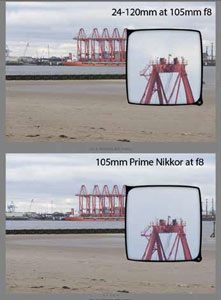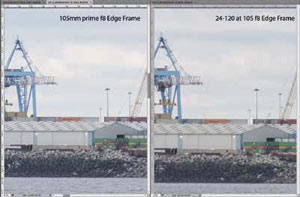articles/Cameras/nikon-d810-page2
Nikon D810 - part 2 of 1 2 3 4 5 6
by Mike McNamee Published 01/02/2016

At 105mm f8 there was a detectable difference between the 24-120mm and a prime 105mm Nikkor
Lens Choices
The need to replace a couple of stolen lenses, along with the camera, led to some soul-searching. The lost lenses were the Nikkor 24-70mm
f2.8 and the Samyang 24mm f3.5 TS. Neither was directly replaced. The
Nikkor 24-70mm proved to be a superb lens for image resolution and
drawing (distortion) but is very heavy, especially when climbing hills. It
was also rather too heavy and bulky when carrying casually on holiday.
Something more versatile was craved for. The Samyang was also excellent
but was also bulky and even less versatile. The frequent need to use the
shift lens at low camera heights to assist in dramatising the shot was
proving difficult for your editor's limpy leg and, after recent surgery, near
impossible!
So for all these reasons we ended up with the Nikkor 24-120mm f4 VR
zoom. This is by no means a perfect lens and is not really considered a
'professional' lens for many purposes but has great versatility as a solo
workhorse. Nikon also seem to think so as the lens is bundled as a 'kit'
with the D810. Our own view is that the 24-120 can do as the 'take
anywhere' and for more serious stuff prime lenses are sharper, lighter
and of similar total cost. These decisions sometimes depend upon what
lenses you already own. In our case the 14-24mm f2.8 zoom Nikkor had
proved problematic. It was very heavy for carrying in the hills especially as
the 24mm end was doubled up with the (then) 24-70mm and the 24mm
Samyang. We considered the case for equipping the 14-24mm with a Big
Stopper kit and then using it instead of the 24-120 for wide shots. The
cost of the 150mm Big Stopper and the accessory holders is significant
(see table) and the difference almost makes up the price of a prime 24mm
along with a 100mm Lee system.
All of these sums can keep you entertained over a long winter's night as
can pondering the slight fall in total cost of three primes versus a topclass
zoom with a weight advantage as well! An additional point is that
the resolution of the D810 is so high that a bit more cropping is available
while retaining the ability to make reasonably sized prints.

Lens Performance 24-120mm f4 Nikkor
After a couple of weeks testing the 24-120mm f4 we have decided that
the lens does not really cut it as a professional optic for commercial
photography. Too much plastic, way too much distortion, vignetting
and softness at wide aperture are all condemning features. Having said
that the lens is light, compact and versatile, and therefore ideal as a
carry-everywhere lens. The pump action of the zoom is also a concern
as this caused significant ingress of dust on the 24-85mm Nikkor of
similar design that we once owned. We found the flimsy attachment of
the lens hood a problem and shot
with it cocked over by mistake in
one test sequence, producing quite
an ugly intrusion into the shot. By
comparison the 24-70 came with a
locking lens hood and very sturdy
carry case - you get what you pay
for! The 24-120 is also equipped
with VR, this worked reasonably
well but we never managed to get
the improvement claimed in the
advertising literature.
Some of the concerns listed above
are moot for you cannot design a
lens of this versatility without some
compromises. Distortion can be
eliminated in Camera Raw, lenses
used wide open often benefit
from some flattering softness and
if you are to exploit the D810 to
its potential then you'll need to be
on a tripod anyway (and should
usually find a way of getting a couple
stops down at least). The higher
residual chromatic aberration can
also be removed in ACR. As far as
we could tell, the penalty for using
ACR distortion-correction was not
detectable, whereas camera shake most certainly was!
Please Note:
There is more than one page for this Article.
You are currently on page 2
- Nikon D810 page 1
- Nikon D810 page 2
- Nikon D810 page 3
- Nikon D810 page 4
- Nikon D810 page 5
- Nikon D810 page 6
1st Published 01/02/2016
last update 21/07/2022 08:46:25
More Cameras Articles
There are 0 days to get ready for The Society of Photographers Convention and Trade Show at The Novotel London West, Hammersmith ...
which starts on Wednesday 14th January 2026










